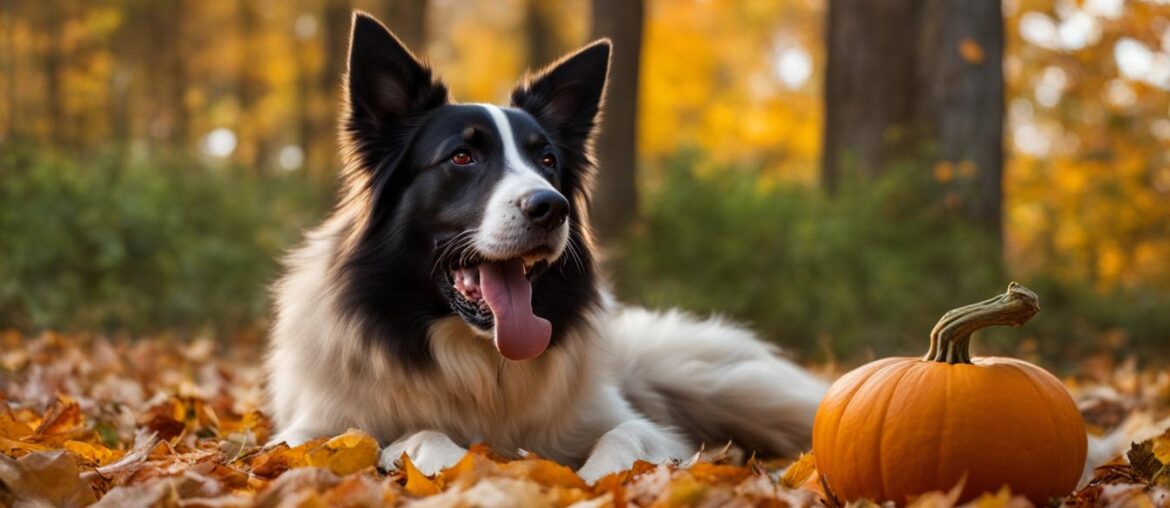As a responsible dog owner, you want to ensure your furry friend’s diet is both safe and nutritious. You may have heard about the benefits of incorporating vegetables into a dog’s diet, and one vegetable that often comes up is butternut squash. But is butternut squash safe for dogs? Can dogs eat it without any risks? Let’s explore the topic in detail.
Key Takeaways:
- Butternut squash is safe and healthy for dogs to eat in moderation.
- Removing the seeds, skin, and rinds before feeding is essential.
- Butternut squash is rich in fiber, vitamins A and C, and beta-carotene.
- It can promote digestion, support the immune system, and improve the condition of the fur.
- Always serve cooked and plain butternut squash without any seasoning or additives.
Types of Squash Safe for Dogs
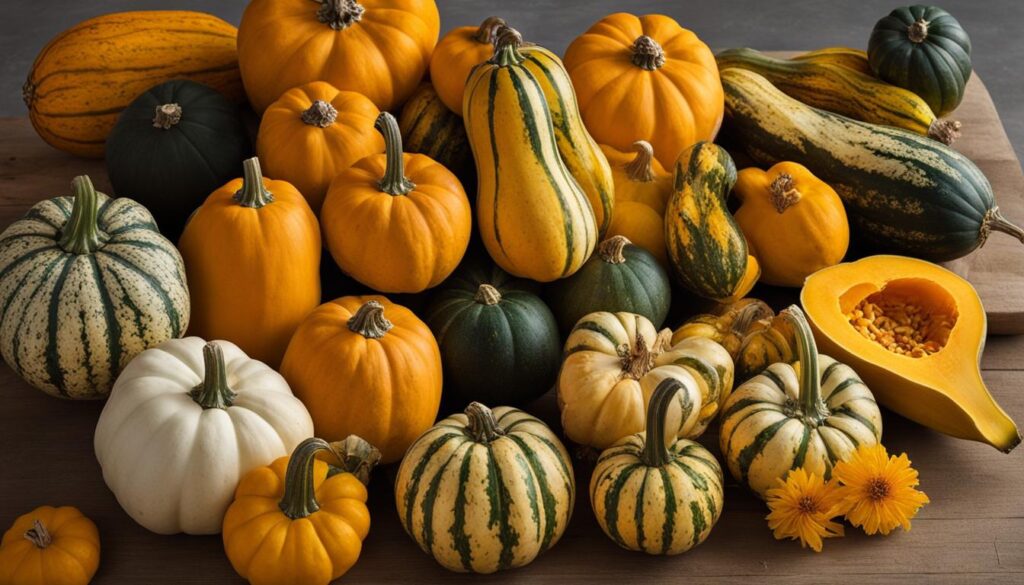
When it comes to feeding squash to dogs, there are several varieties that are safe and beneficial for their health. The best types of squash for dogs include butternut squash, pumpkin, zucchini, and acorn squash. Each of these squashes offers unique nutritional benefits and is safe for dogs to consume in moderation.
Butternut Squash
Butternut squash is a popular choice for dogs due to its mild flavor and nutrient-rich profile. It is packed with fiber, vitamins A and C, and beta-carotene, which support digestive health, boost the immune system, and promote a shiny coat.
Pumpkin
Pumpkin is often recommended for dogs with digestive issues due to its high fiber content. It can help regulate bowel movements and alleviate constipation or diarrhea. Pumpkin is also rich in vitamins A, C, and E, which contribute to overall health and well-being.
Zucchini
Zucchini is the most easily digestible squash for dogs and is a great option for those with sensitive stomachs. It is low in calories and packed with water, making it a hydrating and refreshing treat. Zucchini also contains vitamins B6 and K, as well as minerals like manganese and potassium.
Acorn Squash
Acorn squash is another safe option for dogs and offers a variety of nutritional benefits. It is rich in fiber, vitamins A and C, potassium, and magnesium. These nutrients promote healthy digestion, support bone health, and aid in muscle function.
It’s important to note that while these types of squash are safe for dogs, other forms of squash such as pumpkin pie filling should be avoided. Pumpkin pie filling often contains toxic artificial sweeteners which can be harmful to dogs. Additionally, it’s always recommended to consult with a veterinarian before introducing new foods into your dog’s diet.
Benefits of Butternut Squash for Dogs
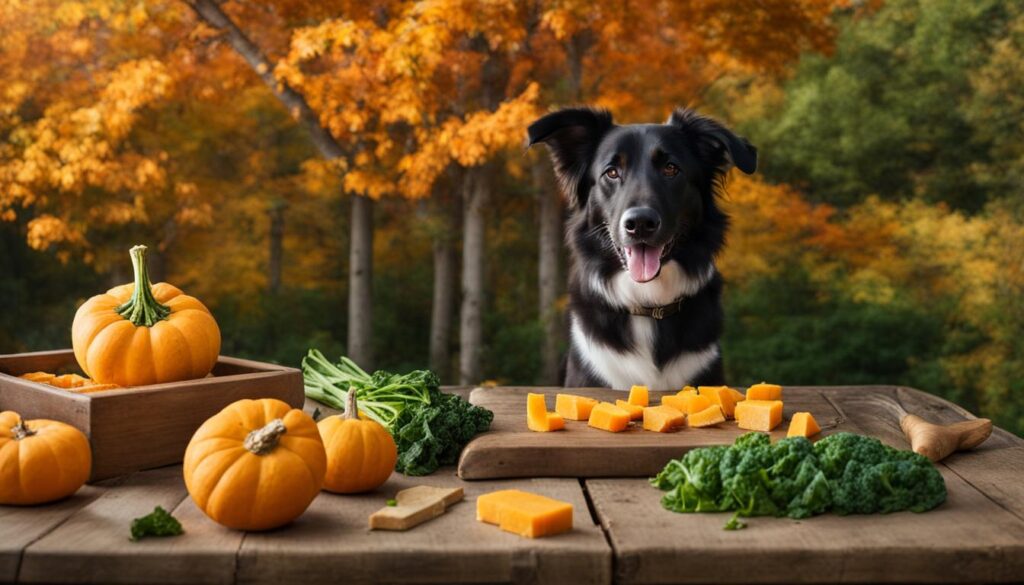
Butternut squash provides a range of benefits for dogs, making it an excellent addition to their diet. Whether it’s promoting healthy digestion, improving the condition of their fur, or boosting their immune system, butternut squash offers numerous advantages for our furry friends.
Promotes Healthy Digestion
The high fiber content in butternut squash aids in maintaining a healthy digestive system for dogs. It can help regulate bowel movements and relieve mild stomach upsets. The fiber acts as a natural cleanser, promoting regularity and preventing constipation.
Supports Cell Health as an Antioxidant
The beta-carotene found in butternut squash acts as a powerful antioxidant in a dog’s body. Antioxidants help protect cells from damage caused by harmful free radicals. By supporting cell health, butternut squash contributes to overall well-being and longevity.
Enhances Immune Function
Butternut squash is rich in vitamins A and C, both of which play a vital role in a dog’s immune system. Vitamin A helps maintain healthy skin and mucous membranes, acting as a barrier against pathogens. Vitamin C, on the other hand, strengthens the immune response and aids in tissue repair.
Promotes Healthy Fur
The various nutrients present in butternut squash, such as vitamins A and C, contribute to the health and appearance of a dog’s fur. These vitamins help prevent dryness, brittleness, and excessive shedding, resulting in a soft and glossy coat.
Aids in Weight Management and Hydration
Butternut squash is low in calories and fat, making it an ideal addition to a dog’s diet for weight management. Additionally, butternut squash has a high water content, which can help keep dogs hydrated, especially during hot summer months.
By incorporating butternut squash into a dog’s diet, pet owners can provide their furry companions with these incredible health benefits. Remember to consult with a veterinarian before making any significant changes to your dog’s diet or if you have any concerns about their overall health.
| Benefits of Butternut Squash for Dogs |
|---|
| Promotes Healthy Digestion |
| Supports Cell Health as an Antioxidant |
| Enhances Immune Function |
| Promotes Healthy Fur |
| Aids in Weight Management and Hydration |
How to Serve Butternut Squash to Dogs
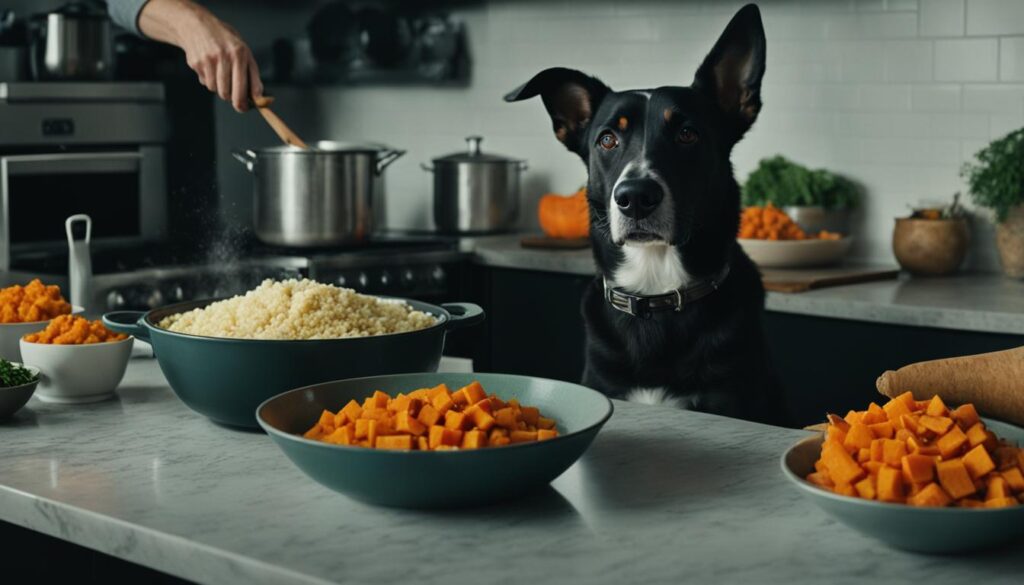
Dogs can enjoy the nutritional benefits of butternut squash when it is served in a safe and appropriate manner. Here are some guidelines on how to serve butternut squash to dogs:
- Cooking Methods: Dogs have an easier time digesting butternut squash when it is steamed or roasted. These cooking methods soften the squash and make it more palatable for dogs.
- Plain and Unseasoned: It is important to serve plain, unseasoned butternut squash to dogs. Avoid adding any additives like butter, onion, salt, or garlic salt, as these can be toxic to dogs. Serve the squash in its natural state to ensure the safety and health of your furry friend.
- Introduce Slowly: When introducing vegetables like butternut squash to a dog’s diet, it is best to start with small portions and gradually increase the amount over time. This allows their digestive system to adjust and reduces the chances of any negative reactions. If you notice any unusual symptoms or discomfort, consult with a veterinarian.
Remember, the well-being of your dog is a top priority. By following these serving guidelines, you can safely incorporate butternut squash into your dog’s diet and provide them with a nutritious and delicious treat.
Disclaimer: While these guidelines are generally applicable, every dog is unique. It is always best to consult with a veterinarian before making any significant changes to your dog’s diet.
Can Dogs Eat Butternut Squash Raw?
Raw butternut squash should not be fed to dogs due to its hard and fibrous texture, which can make it difficult for them to chew and digest. Feeding dogs raw squash can lead to gastrointestinal issues such as stomach problems, vomiting, and diarrhea.
Cooking butternut squash before serving it to dogs helps soften the vegetable, making it easier for them to consume and digest. When cooked, butternut squash becomes more palatable and offers improved nutritional benefits.
It is essential to prioritize the well-being of our furry friends and avoid potential risks that come with feeding them raw butternut squash. By cooking this vegetable thoroughly, we can ensure that dogs receive the nutrients while minimizing any adverse effects on their digestion.
Can Dogs Eat Butternut Squash Skin?
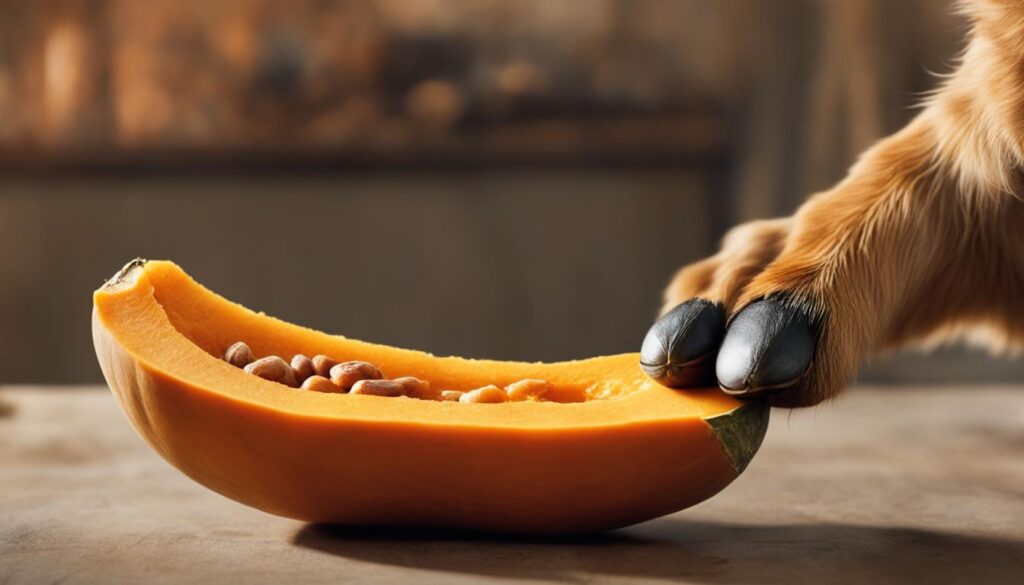
Dogs should not eat butternut squash skin as it is hard and tough to chew and digest. The skin can be a choking hazard and may cause intestinal blockages. It is recommended to peel the butternut squash before cooking or serving it to dogs.
Feeding dogs butternut squash skin can pose several risks to their health and well-being. The skin of butternut squash is fibrous and difficult for dogs to chew and digest, potentially leading to gastrointestinal issues such as stomach discomfort, vomiting, or diarrhea. Moreover, the skin is tough and can become lodged in the digestive tract, causing blockages that may require surgical intervention.
It is important for dog owners to exercise caution when preparing butternut squash for their furry friends. Always remove the skin before cooking or serving it to dogs, ensuring that only the soft and fleshy part of the squash is offered. By peeling the butternut squash, you can eliminate the risks associated with the skin and provide a safer and more enjoyable eating experience for your dog.
Remember, the health and safety of your dog should always be a top priority. If you have any concerns or questions regarding your dog’s diet or the suitability of specific foods, it is best to consult with a veterinarian who can provide expert guidance tailored to your dog’s individual needs.
Can Dogs Eat Butternut Squash Seeds?
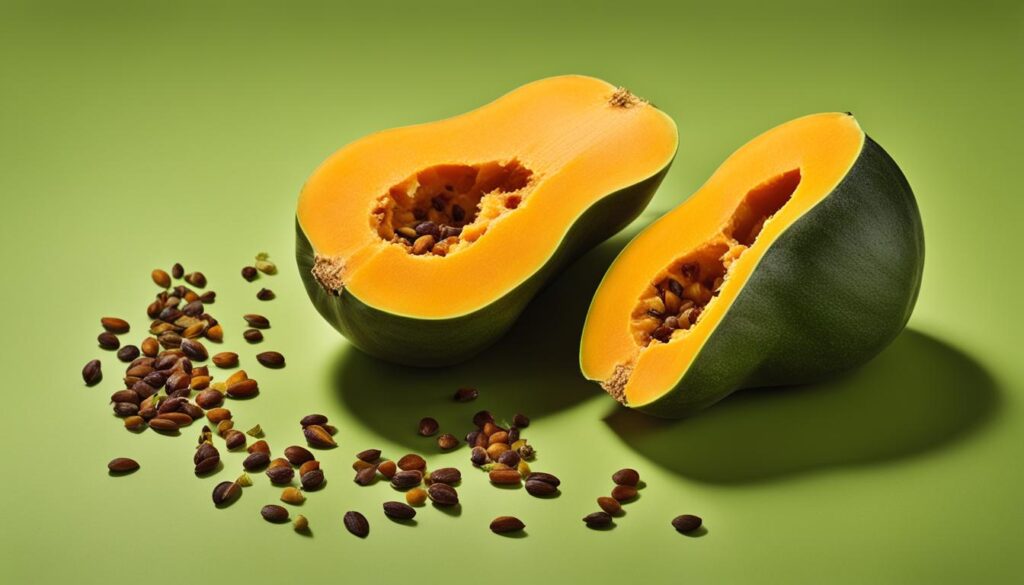
While butternut squash seeds are not toxic to dogs, it is important to be cautious when feeding them to your furry friend. The seeds can pose a choking hazard and may also cause blockages if consumed in large quantities. Therefore, it is recommended to remove the seeds before cooking or serving butternut squash to dogs.
However, there is a way to incorporate butternut squash seeds into your dog’s diet in a safer manner. If the seeds are baked until they become crispy and then blended into a fine consistency, they can be used as a nutritious topper or ingredient in homemade treats. Remember to use the blended seeds in small amounts to prevent any digestive issues.
By removing the seeds or preparing them properly, you can ensure that your dog can safely enjoy the benefits of butternut squash without any risks.
Benefits of Butternut Squash Seeds for Dogs:
- Rich in fiber, which aids in digestion and supports a healthy gastrointestinal system
- Contain vitamins and minerals that contribute to overall canine wellness
- Provide a crunchy texture that can add variety to your dog’s diet
While incorporating butternut squash seeds into your dog’s treats or meals can offer some nutritional benefits, it is essential to do so in moderation and under the guidance of a veterinarian. Every dog is unique, and their dietary needs may vary based on factors such as age, size, and overall health.
| Pros | Cons |
|---|---|
| – Additional source of fiber | – Choking hazard |
| – Nutritious and crunchy | – Potential for blockages |
| – Can be used as a topper or ingredient in homemade treats | – Digestive issues if consumed in large quantities |
Nutritional Benefits of Butternut Squash for Dogs
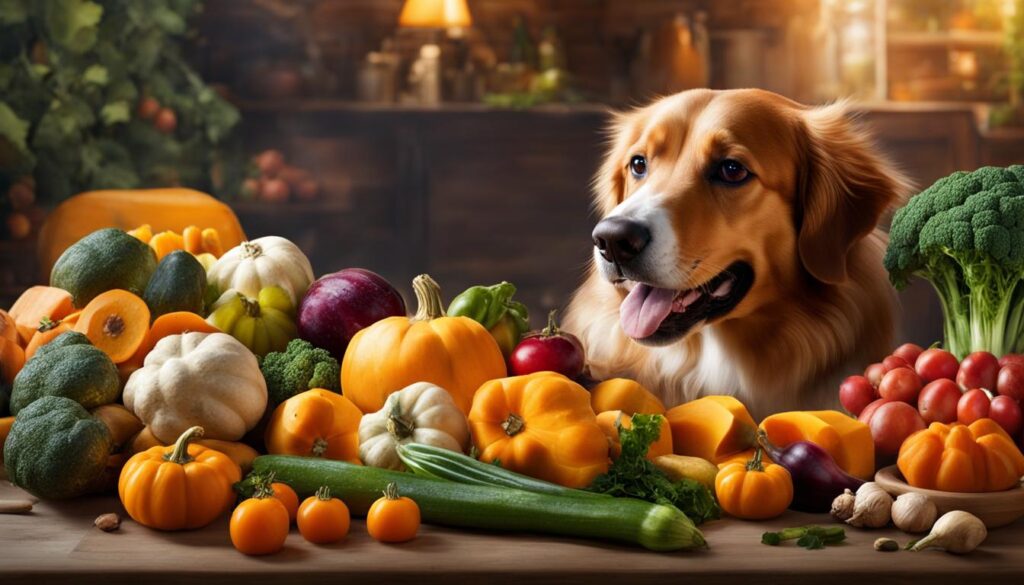
Butternut squash is a nutritious vegetable that provides a range of health benefits for dogs. It is packed with vitamins and minerals that contribute to their overall well-being.
Vitamins:
- Vitamin A: Butternut squash is rich in vitamin A, which is essential for a dog’s immune function, vision, and tissue repair.
- Vitamin C: This vegetable also contains vitamin C, which supports the immune system and helps in collagen production for healthy skin and joints.
Minerals:
- Phosphorus: Butternut squash provides phosphorus, a mineral that supports bone health and is important for energy metabolism.
- Magnesium: Magnesium in butternut squash is essential for muscle function and plays a role in the body’s processing of other minerals.
- Potassium: This vegetable is a good source of potassium, which is crucial for proper heart and nerve function.
Additionally, butternut squash contains beta-carotene, a powerful antioxidant that helps reduce inflammation and supports overall health.
“Butternut squash provides essential vitamins and minerals that contribute to a dog’s overall health and well-being.”
By including butternut squash in their diet, dog owners can provide their furry companions with a natural source of valuable nutrients.
Butternut Squash for Dogs with Diarrhea
Diarrhea can be a common issue for dogs, and incorporating butternut squash into their diet can provide relief. The fiber content in butternut squash helps bind the stool and regulate bowel movements, ultimately making it firmer and easier to pass. This can help alleviate the symptoms of diarrhea in dogs.
However, it is important to remember that moderation is key when feeding butternut squash to dogs with diarrhea. While the fiber in squash can be beneficial, too much fiber can actually worsen the condition. It is recommended to introduce butternut squash gradually and monitor your dog’s response.
If your dog experiences persistent or severe diarrhea, it is essential to consult with a veterinarian. They can provide appropriate guidance and determine if additional treatment is necessary. Diarrhea can be a symptom of underlying health issues, so professional advice is important to ensure the well-being of your furry companion.
Recommended Serving Size of Butternut Squash for Dogs
When it comes to serving butternut squash to your furry friend, it’s important to consider their size. The recommended serving size of butternut squash for dogs can vary based on their weight and breed. By feeding the appropriate amount, you can ensure that your dog enjoys the benefits of butternut squash without any potential drawbacks.
For toy dogs weighing up to 10 pounds, a teaspoon or two of cooked butternut squash per day is a suitable serving size. This small amount will provide them with the nutritional benefits of butternut squash without overwhelming their digestive system.
Medium-sized dogs weighing between 10 and 30 pounds can safely consume a tablespoon or two of cooked butternut squash daily. This quantity allows them to enjoy the flavors and nutritional value of butternut squash while maintaining a balanced diet.
Larger breeds weighing over 30 pounds can have even more butternut squash in their diet. Aim for two tablespoons or more, depending on their size and individual dietary needs. Remember, moderation is key to ensure your furry friend receives the right amount of nutrients without any negative effects.
Feeding butternut squash in the appropriate serving size helps prevent potential issues like vitamin A toxicity. While butternut squash is generally safe for dogs, excessive consumption can lead to an imbalance of nutrients. As with any new food, it’s always best to introduce butternut squash gradually and monitor your dog for any adverse reactions.
Benefits of Appropriate Butternut Squash Serving Size
Feeding butternut squash in the recommended serving size ensures that your dog can benefit from its nutritional value. Butternut squash is a great source of fiber, vitamins A and C, and other essential minerals. These nutrients support your dog’s overall health by promoting digestion, boosting the immune system, and contributing to their well-being.
Providing your furry friend with the right amount of butternut squash can also prevent any potential digestive issues that may arise from excessive consumption. By adhering to the appropriate serving size, you can enjoy the benefits of butternut squash for your dog while keeping their diet balanced and well-rounded.
Table: Recommended Serving Size of Butternut Squash for Dogs
| Dog Size | Serving Size of Butternut Squash |
|---|---|
| Toy Dogs (up to 10 pounds) | A teaspoon or two |
| Medium-sized Dogs (10-30 pounds) | A tablespoon or two |
| Larger Breeds (over 30 pounds) | Two tablespoons or more |
Remember to consult with your veterinarian regarding your dog’s specific dietary needs. They can provide you with personalized recommendations based on your dog’s size, breed, and overall health. With the right serving size of butternut squash, you can incorporate this nutrient-rich vegetable into your dog’s diet and enhance their well-being.
Feeding Butternut Squash to Dogs Daily
Feeding butternut squash to dogs daily can be a nutritious and beneficial addition to their diet. However, it is important to remember that variety is key. Rotate butternut squash with other fruits and vegetables to provide a balanced nutrient intake and keep your dog’s snacks interesting.
If you enjoy making homemade treats for your furry friend, incorporating butternut squash can be a great option. Offering one or two treats a day, depending on your dog’s size, is generally recommended. Remember to monitor your dog’s weight and overall health to ensure they maintain a healthy diet.
Feeding butternut squash to dogs daily provides a range of health benefits. It is packed with fiber, which aids in digestion and supports a healthy gastrointestinal system. Additionally, butternut squash is a great source of vitamins A and C, which boost the immune system and contribute to overall well-being.
To give you a better idea of the potential benefits, here is a breakdown of the nutritional content of butternut squash:
| Nutrient | Amount per 100g |
|---|---|
| Calories | 45 |
| Carbohydrates | 12g |
| Fiber | 2g |
| Protein | 1g |
| Fat | 0g |
| Vitamin A | 14,881IU |
| Vitamin C | 21mg |
| Potassium | 352mg |
Incorporating butternut squash into your dog’s daily diet can be a wonderful way to provide them with essential nutrients and promote overall wellness.
Wrapping Up
Butternut squash is a safe and healthy vegetable for dogs to eat. It offers numerous health benefits, including improved digestion, hydration, and immune support. Dogs can enjoy butternut squash in their meals or as a treat, as long as it is cooked, plain, and served in moderation. It is always important to consult with a veterinarian before making any significant changes to a dog’s diet.
Feeding dogs butternut squash can provide them with essential nutrients such as fiber, beta-carotene, and vitamins A and C. These nutrients contribute to a dog’s overall well-being and can help maintain a healthy weight, promote a shiny coat, and support their immune system. However, it is important to remember not to feed dogs raw butternut squash, as it can be difficult to digest and cause gastrointestinal issues.
Remember to remove the seeds and skin of the butternut squash before serving it to dogs, as they can present choking hazards and be hard to digest. Additionally, always serve butternut squash without any seasonings or additives that may be harmful to dogs. By following these guidelines and consulting with a veterinarian, you can safely incorporate butternut squash into your dog’s diet and provide them with a nutritious and delicious treat.
FAQ
Is butternut squash safe for dogs to eat?
Yes, butternut squash is safe for dogs to eat.
What are the benefits of butternut squash for dogs?
Butternut squash provides numerous health benefits for dogs, including improved digestion, hydration, and immune support.
What types of squash are safe for dogs?
Dogs can safely eat butternut squash, pumpkin, zucchini, and acorn squash.
How should I serve butternut squash to dogs?
Butternut squash should be cooked and served plain, without any seasoning or additives.
Can dogs eat raw butternut squash?
No, dogs should not eat raw butternut squash as it can be difficult to chew and digest.
Can dogs eat butternut squash skin?
No, dogs should not eat butternut squash skin as it can be tough to chew and may cause choking or blockages.
Can dogs eat butternut squash seeds?
It is best to remove the seeds before feeding butternut squash to dogs as they can be a choking hazard and may cause blockages.
What are the nutritional benefits of butternut squash for dogs?
Butternut squash is rich in fiber, beta-carotene, vitamins A and C, and minerals like phosphorus, magnesium, and potassium, which contribute to overall health.
Can butternut squash help dogs with diarrhea?
Yes, the fiber in butternut squash can help firm up stools and regulate bowel movements, making it beneficial for dogs with diarrhea.
What is the recommended serving size of butternut squash for dogs?
The recommended serving size of butternut squash for dogs depends on their size, but it is important to feed it in moderation to avoid vitamin A toxicity and other potential issues.
Can I feed butternut squash to dogs daily?
Yes, butternut squash can be included in a dog’s daily diet, but it is important to rotate it with other fruits and vegetables for a balanced nutrient intake.


